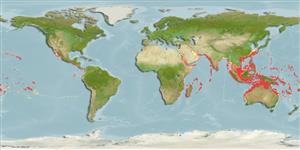Common names from other countries
Environment: milieu / climate zone / depth range / distribution range
экология
морской ассоциированный с рифами; немигрирующий; пределы глубины 3 - 300 m (Ref. 89972), usually 15 - ? m (Ref. 5222). Tropical; 30°N - 37°S, 30°E - 23°W (Ref. 5222)
Indo-Pacific: Red Sea to South Africa and the Pitcairn Islands, north to southern Japan, south to New South Wales, Australia. Not found in the Persian Gulf nor in Hawaii.
Length at first maturity / Size / Вес / Возраст
Maturity: Lm 47.6, range 41 - ? cm
Max length : 83.0 cm TL самец/пол неопределен; (Ref. 40637); common length : 75.0 cm TL самец/пол неопределен; (Ref. 5450); наибольший вес (опубликованные данные): 12.0 kg (Ref. 5222)
колючие лучи спинного плавника (общее число) : 9; членистые (мягкие) лучи спинного плавника (общее число) : 13 - 14; колючие лучи анального плавника: 3; членистые (мягкие) лучи анального плавника: 8. This species is distinguished by the following characters: body oblong, its depth less than head length and 2.8-3.3 in SL; preopercle rounded, finely serrate, the lower edge fleshy; opercle with 3 flat spines; upper edge of operculum almost straight; 1-3 large canines at midside of lower jaw; gill rakers of first gill arch 7-10 + 15-18 (including 6-87 rudiments on each limb); D IX,13-14; caudal fin lunate, the upper and lower lobes produced, about twice length of middle rays; pectoral-fin rays 16-19; lateral-line scales 66-77; lateral scale series 113-135. Colour of head, body, and median fins yellowish brown to orange-red (specimens from deep water more reddish) with numerous small round or elongate spots of blue, lavender or pink; rear margin of median fins broadly yellow; pectoral-fin rays red to brown, the distal third abruptly yellow[ large juveniles (10-25 cm SL) with irregular black band along dorsal part of body ending below rear of dorsal fin and continuing on head (up to eye) as 3 irregular black spots; black blotch at base of upper caudal-fin rays; head and body (including black band) with small pale blue to pink spots; a pale yellow or white stripe mid-dorsally on head from tip of lower jaw to dorsal-fin origin; small juveniles (< 7 cm SL) lack the black band and black spots on dorsal part of head and body (Ref. 39231, 89707, 90102).
Usually seen in clear-water areas at depths below 15 m, and prefers islands and offshore reefs rather than continental shores. Feeds mainly on fishes, and on crabs, shrimps and stomatopods. It is highly appreciated for the quality of its flesh. It may not be sold in Mauritius because of cases of ciguatera poisoning (Ref. 11888). In the Hong Kong live fish markets (Ref. 27253). This common and important food fish is caught with handlines, spear, and traps (Ref. 39231).
Life cycle and mating behavior
Maturities | размножение | Spawnings | Egg(s) | Fecundities | личинки
Heemstra, P.C. and J.E. Randall, 1993. FAO Species Catalogue. Vol. 16. Groupers of the world (family Serranidae, subfamily Epinephelinae). An annotated and illustrated catalogue of the grouper, rockcod, hind, coral grouper and lyretail species known to date. Rome: FAO. FAO Fish. Synop. 125(16):382 p. (Ref. 5222)
Статус Красного Списка МСОП (Ref. 130435)
CITES (Ref. 128078)
Not Evaluated
Угроза для людей
Reports of ciguatera poisoning (Ref. 4690)
Использование человеком
рыболовство: коммерческий; объект спортивного рыболовства: да; аквариум: коммерческий
дополнительная информация
инструменты
Специальные отчеты
Скачать в формате XML
ресурсы в Интернет
Estimates based on models
Preferred temperature (Ref.
115969): 20.1 - 28.9, mean 27.2 (based on 2394 cells).
Phylogenetic diversity index (Ref.
82804): PD
50 = 0.7500 [Uniqueness, from 0.5 = low to 2.0 = high].
Bayesian length-weight: a=0.01096 (0.00991 - 0.01213), b=3.03 (3.00 - 3.06), in cm Total Length, based on LWR estimates for this species (Ref.
93245).
Trophic level (Ref.
69278): 4.3 ±0.7 se; based on diet studies.
устойчивость к внешним воздействиям (Ref.
120179): средний (среднего размера), минимальное время удвоения популяции 1.4-4.4 года (Tmax=7-15; K=0.18).
Fishing Vulnerability (Ref.
59153): Moderate vulnerability (43 of 100).
Climate Vulnerability (Ref.
125649): High to very high vulnerability (72 of 100).
